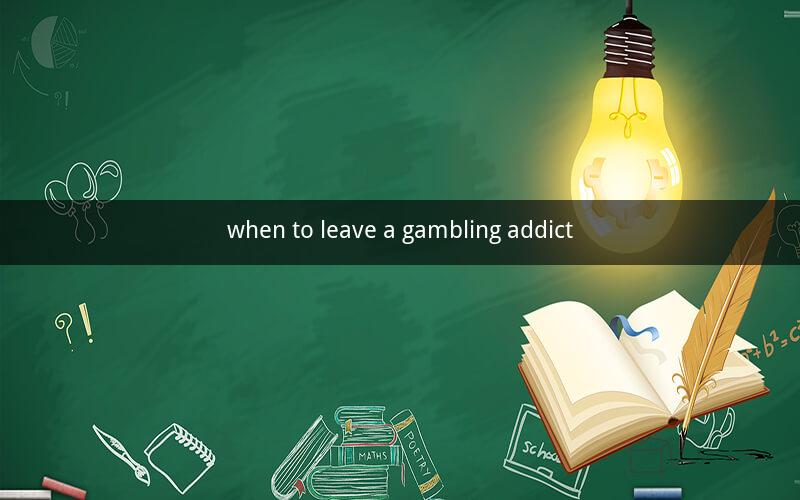
Directory
1. Understanding Gambling Addiction
2. Signs of a Problematic Gambling Behavior
3. The Impact of Gambling Addiction on Individuals and Families
4. When to Consider Intervention
5. The Importance of Timing in Intervention
6. Steps to Take Before Leaving a Gambling Addict
7. The Role of Support Systems
8. The Process of Leaving a Gambling Addict
9. Dealing with the Aftermath
10. Long-Term Support and Recovery
1. Understanding Gambling Addiction
Gambling addiction, also known as compulsive gambling, is a behavioral disorder characterized by an inability to control the urge to gamble despite negative consequences. It is a complex condition that can affect individuals of all ages, backgrounds, and socioeconomic statuses. Understanding the nature of gambling addiction is crucial in determining when it is appropriate to leave a gambling addict.
2. Signs of a Problematic Gambling Behavior
Identifying the signs of problematic gambling behavior is the first step in recognizing when it may be time to leave a gambling addict. These signs include:
- Preoccupation with gambling, even when it interferes with daily responsibilities or social activities.
- Increasing the amount of time spent gambling.
- Borrowing money to fund gambling activities.
- Lying to family, friends, or employers about gambling habits.
- Feeling restless or irritable when not gambling.
- Continuing to gamble despite financial, legal, or personal problems.
3. The Impact of Gambling Addiction on Individuals and Families
Gambling addiction can have devastating consequences for both individuals and their families. The impact includes:
- Financial ruin, as individuals may spend all their money on gambling.
- Relationship problems, as gambling can lead to dishonesty, secrecy, and emotional distance.
- Legal issues, such as arrest for theft or fraud to fund gambling.
- Mental health issues, including depression, anxiety, and substance abuse.
4. When to Consider Intervention
Determining when to consider intervention is a critical decision. The following situations may indicate it is time to leave a gambling addict:
- The individual has shown a willingness to seek help but has not followed through.
- The individual's gambling has caused significant harm to themselves or their family.
- The individual has attempted to stop gambling but has been unsuccessful.
- The individual's gambling has led to legal or financial consequences.
5. The Importance of Timing in Intervention
Timing is crucial in intervention. It is important to act when the individual is most receptive to change. This may be after a particularly severe consequence of their gambling, such as a financial crisis or a legal issue.
6. Steps to Take Before Leaving a Gambling Addict
Before leaving a gambling addict, consider the following steps:
- Educate yourself about gambling addiction to better understand the situation.
- Gather information about available resources and support systems.
- Plan a safe and supportive environment for the individual.
- Prepare a list of consequences of their gambling behavior that they can relate to.
7. The Role of Support Systems
Support systems, including family, friends, and professionals, play a vital role in helping a gambling addict. These support systems can:
- Provide emotional support and encouragement.
- Help the individual find treatment and recovery resources.
- Monitor the individual's progress and offer accountability.
8. The Process of Leaving a Gambling Addict
Leaving a gambling addict involves several steps:
- Have a calm and honest conversation about the consequences of their gambling.
- Set clear boundaries and consequences for continued gambling behavior.
- Encourage the individual to seek professional help.
- Support the individual through the recovery process.
9. Dealing with the Aftermath
The aftermath of leaving a gambling addict can be challenging. It is important to:
- Acknowledge and address any emotional or financial consequences.
- Continue to support the individual through their recovery journey.
- Seek support for yourself, as you may also be affected by the situation.
10. Long-Term Support and Recovery
Long-term support and recovery are essential for a gambling addict. This includes:
- Continuing to seek professional help and therapy.
- Participating in support groups and recovery programs.
- Building a strong support network of friends and family.
- Developing healthy coping mechanisms to deal with stress and temptation.
Questions and Answers
1. Q: How can I tell if someone is a gambling addict?
A: Look for signs such as preoccupation with gambling, increasing time spent gambling, borrowing money, lying about gambling, and experiencing negative consequences due to gambling.
2. Q: What are the consequences of gambling addiction?
A: Consequences include financial ruin, relationship problems, legal issues, and mental health issues such as depression and anxiety.
3. Q: When is the best time to intervene with a gambling addict?
A: The best time is when the individual is most receptive to change, often after a severe consequence of their gambling.
4. Q: How can I support a gambling addict?
A: You can support them by providing emotional support, helping them find treatment, and monitoring their progress.
5. Q: What are some resources for gambling addiction?
A: Resources include counseling services, support groups, and treatment programs.
6. Q: Can gambling addiction be cured?
A: While there is no cure, gambling addiction can be effectively managed through treatment and recovery.
7. Q: How can I help my family recover from the effects of gambling addiction?
A: Seek support for your family, including counseling and support groups, and work on rebuilding trust and relationships.
8. Q: What are the signs of a gambling relapse?
A: Signs include a return to gambling behavior, increased secrecy, and a lack of interest in recovery activities.
9. Q: How can I protect myself from being financially exploited by a gambling addict?
A: Set boundaries and monitor financial transactions, and seek professional advice if necessary.
10. Q: What is the most important thing to remember when dealing with a gambling addict?
A: Patience and understanding are key. Recovery is a long process, and it is important to support the individual through it.